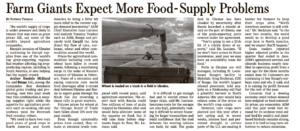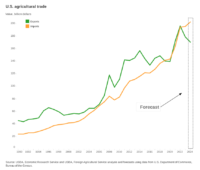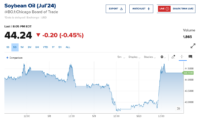Bloomberg's Clarice Couto reported this past Friday that "a surprising tax change in agriculture powerhouse Brazil has the potential to make soy grown in the world’s largest bean exporter less…
Under Export Deal, First Ship Carrying Grain Leaves Ukrainian Port of Odesa For Lebanon
Reuters writer Natalia Zinets reported today that, “A ship carrying grain left the Ukrainian port of Odesa for Lebanon on Monday under a safe passage agreement, Ukrainian and Turkish officials said, the first departure since the Russian invasion blocked shipping through the Black Sea five months ago.
“Ukraine’s foreign minister called it ‘a day of relief for the world,’ especially for countries threatened by food shortages and hunger because of the disrupted shipments.”
The day of relief for the world, especially for our friends in the Middle East, Asia, and Africa, as the first Ukrainian grain leaves Odesa after months of Russian blockade. Ukraine has always been a reliable partner and will remain one should Russia respect its part of the deal.
— Dmytro Kuleba (@DmytroKuleba) August 1, 2022
The Reuters article noted that, “The Turkish defence minister said earlier that the Sierra Leone-flagged ship Razoni would head to Lebanon.”
And they're off: The first ship carrying #Ukraine #wheat has departed Odessa port, bound for Lebanon. pic.twitter.com/UrtDbpwyGH
— Gavin Maguire (@GavinJMaguire) August 1, 2022
Zinets added that, “Ukrainian presidential officials have said 17 ships are docked in Black Sea ports with almost 600,000 tonnes of cargo, mostly grain.
“[Ukraininan Infrastructure Minister Oleksandr Kubrakov] said more ships would follow. Unlocking the ports would provide at least $1 billion in foreign exchange revenue for Ukraine’s economy and allow the agricultural sector to plan next year’s sowing season, he said.”
Prevent world famine together with @UN, @EU_Commission, #G7. The first ship left the Odesa port since 24.02.2022 pic.twitter.com/Nin8nSV8LM
— Oleksandr Kubrakov (@OlKubrakov) August 1, 2022
Also today, Bloomberg writers Ugur Yilmaz and Aliaksandr Kudrytski reported that, “Scores of ships are stuck in the ports dotted along the Black Sea and are expected to begin moving out in ‘caravans‘ if all goes well. However, shipowners will have to secure insurance for cargoes and vessels, and also find enough crew to sail them. A Russian attack on Odesa’s sea port with cruise missiles hours after signing the deal raised questions earlier about its commitment.”
.@antonioguterres warmly welcomes the departure of the M/V Razoni, the first commercial ship leaving Ukraine’s port of Odesa since 26 February 2022. Ensuring that existing grain and foodstuffs can move to global markets is a humanitarian imperative. 👇👇👇https://t.co/YxCjl7XSvk pic.twitter.com/oy65FURNn4
— UN Spokesperson (@UN_Spokesperson) August 1, 2022
And Wall Street Journal writers Matthew Luxmoore and Jared Malsin reported today that, “While the start of shipments is promising for Ukrainian farmers and the country’s mainly developing-world buyers, the flow of corn, wheat and barley will still be lower than before the war. It will take months to clear the backlog of grain, and this season’s harvests are expected to be depleted by the war. The U.S. Department of Agriculture predicts Ukraine will export 30.6 million metric tons of grains and seeds over the 2022-23 season, almost half the tonnage of the season before.”
Michael Schwirtz, Matina Stevis-Gridneff and Matthew Mpoke Bigg reported today at The New York Times Online that, “The shipments will follow a route to Turkish ports approved by the Russian Navy, which has demanded that the unloaded ships are inspected before they return to Ukraine to ensure they carry no weapons.
“Teams from Russia, Ukraine, Turkey and the U.N. will jointly carry out the inspections, and a joint command center set up in Istanbul is to monitoring the movement of grain.
“The agreement will last 120 days, but it could be renewed on a rolling basis.”
Meanwhile, Bloomberg writers Olesia Safronova and Aine Quinn reported yesterday that, “The multi-millionaire owner of Nibulon, one of Ukraine’s largest agricultural companies, died during a Russian attack on the southern city of Mykolaiv on Sunday, according to the region’s governor.
“Oleksiy Vadaturskyi and his wife Raisa Vadaturska were killed in their home during shelling that hit several targets, including schools, a sports complex and private residences, governor Vitaliy Kim said in a post on Telegram.”
Elsewhere, Patrick Thomas reported in today’s Wall Street Journal that,
The world’s supply of crops is under pressure and likely to remain that way even as grain prices fall, say some of the world’s largest agriculture companies.
“Russia’s invasion of Ukraine is continuing to disrupt supplies from one of the world’s top grain-exporting regions. Bad weather affecting big crop-producing regions, including in South America, is also helping to fuel the supply crunch.
“Archer Daniels Midland Co. and Bunge Ltd., among the companies that dominate global grain trading and processing, said this past week that this combination is keeping supplies tight while the appetite for agriculture products such as cooking oils and soybean meal for livestock feed remains robust.”

On Saturday, Alistair MacDonald reported at The Wall Street Journal Online that, “This harvest will be an early test of how Ukrainian farming is faring. Early readings suggest low yields owing to overly warm weather and a lack of fertilizer. A poor harvest would compound problems for the many farmers who have been unable to sell all their crops and are already struggling to finance the next round of planting. Restoring destroyed infrastructure and getting workers to return to the fields will take time.
“While a recent agreement between Moscow and Kyiv to give grain shipments safe passage from Ukraine’s blockaded ports offers some hope for boosting exports over time, many farmers say they have little faith the deal will hold.”
More broadly, Joe Rennison reported in today’s New York Times that, “The price of wheat has tumbled from its peak after Russia invaded Ukraine, but experts say one of the world’s most widely consumed foods remains in short supply and warn that a global hunger crisis still looms.

“Like oil, steel, beef and other commodities integral to the economy, wheat shifts in price and availability in response to a complex set of overlapping factors, such as geopolitics and the weather. While the falling price of wheat offers some respite for countries dependent on importing the crop, it may dissuade farmers from planting more.
“Nor does the drop in price address pre-existing problems worsened by a war between two of the world’s biggest producers. Energy prices remain high, affecting the cost of running farm equipment and transporting the wheat to market as well as the cost of fertilizer. And hot, dry weather that crimps crop yields is becoming more common.”







